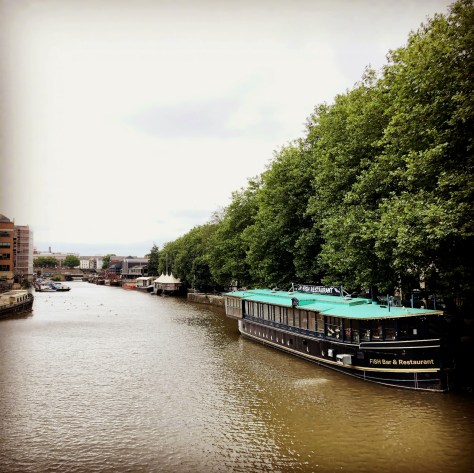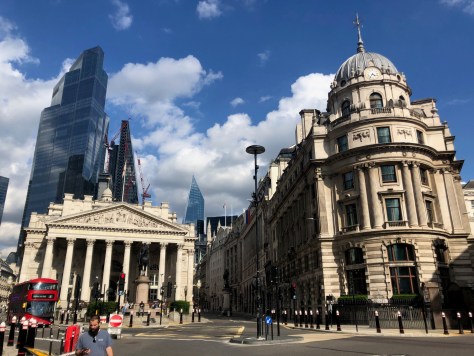
For the first time in a while I had a full working week.
I was back in London for the first half of the week and then off to Leamington Spa for an in-person Team Away Day at the end of the week. The first half of the week was very hot, very nice in fact, even if travelling was slightly uncomfortable down to the heat. I certainly noticed the large increase in people in London this week compared to visits in the summer.
A very bizarre and interesting Twitter thread on what was required for books.
ALT-C took place this week, as an online event. I decided that I didn’t have the capacity to attend this week (and make the most of it), so viewed it afar via the Twitter.
In the past I’ve always enjoyed attending ALT-C and am looking forward to attending the next time it happens as an in-person event.
To be honest, are we surprised by this?
No. I wasn’t.
Also, it wasn’t AI, it was the human who wrote (or programmed) the algorithm. In the same way that humans can programme bias (usually unconsciously) into algorithms, humans can also programme unbias into those same algorithms.

The Kenyans who are helping the world to cheat from BBC News.
If a student in London or New York goes online to pay somebody to do their essay, the chances are the work will actually end up being done by somebody in Kenya. BBC Trending reports from Nairobi on the ghost writers helping foreigners to cheat.
Though we may want to find technological solutions to essay mills, another option (or an additional option) is to rethink assessment so it is less dependent on essays that can be outsourced.
The BBC News also reports that Three brings in EU roaming charges and ends global scheme.
Three is the latest mobile network to announce it is reintroducing roaming charges between the UK and Europe. From 23 May 2022, customers who have taken out a new or upgraded contract after 1 October will have to pay £2 a day to use their monthly allowance of minutes, texts and data in the EU. It follows similar announcements from EE and Vodafone earlier this year.

The away day was taking place at Ashorne Hill Conference Centre. To say day was a bit of misnomer, as it was a lunchtime to lunchtime away day over two days. I drove up to the conference centre and parked the car at which point there were some colleagues from my directorate just parking as well. We went inside for coffee. I’ve forgotten how bad conference centre coffee is. Not something I missed. It was bean coffee from a machine, but even so…
We had an introductory session and then we had lunch, before heading inside to listen to some speakers, an external, someone from FE and someone from HE. We then had some team discussions about the next year and what are priorities were.
After finding my room, I had a few snacks. I then changed and went to the bar and had a beer. We had a nice (conference) dinner. I had crispy chilli beef (which wasn’t very crispy). For my main, I had the chicken with wild mushrooms. For dessert I had cheese and biscuits. We talked and then we went to the bar. It was both a normal and a bizarre experience. I would do this kind of thing a lot pre-covid, but doing this after 18 months of restrictions and lockdowns, it was surprisingly refreshing and normal.

Had breakfast on Friday. Quite bizarre having breakfast with colleagues in a conference centre. I think the last time I did this was back in 2018.
We had a good session discussing the HE strategy. One question came up on priorities and we discussed authentic assessment. In a previous report Jisc has recommended that assessment should be authentic. This is something that in some ways needs to be said, but also in some ways doesn’t. I think what universities find hard to do is to make assessment authentic. How do you actually do that and how do you know you’ve done it? It’s very easy to say make assessment authentic, but hard to actually help people to make it authentic. I am sure most academics, if asked, would argue that their assessments are already authentic. Are they? How would we know and would they know? A further area of discussion was, what was the role of Jisc in this process?
I then drove home. I went via the A46 rather than the M42. For a 90 Mille journey Waze was saying it would take nearly three hours to get home, it was also saying I should take the M4 and then the M49. The implication was that the M5 would be a nightmare (which in the end it was, so I went via Bristol the and A370).
I stopped at the Gloucester services and had a nice flat white sitting outside in the sun. These are nice services and really what you want from motorway services. It was very busy as you might expect. However I was served very quickly.
Universities told by the Government to return to in-person teaching.
Universities have been urged to provide face-to-face teaching when students return this term. Education Secretary Gavin Williamson said students should expect to be taught “in-person and alongside other students”. It would be right to stay online when there’s a “genuine benefit to using technology”, he said. But he warned university leaders: “I do not expect to see online learning used as a cost-cutting measure.”
Bit of an assumption there that ‘online learning’ is (always) cheaper than in-person teaching. Sometimes it can be, but sometimes it can be more expensive.
My top tweet this week was this one.


































